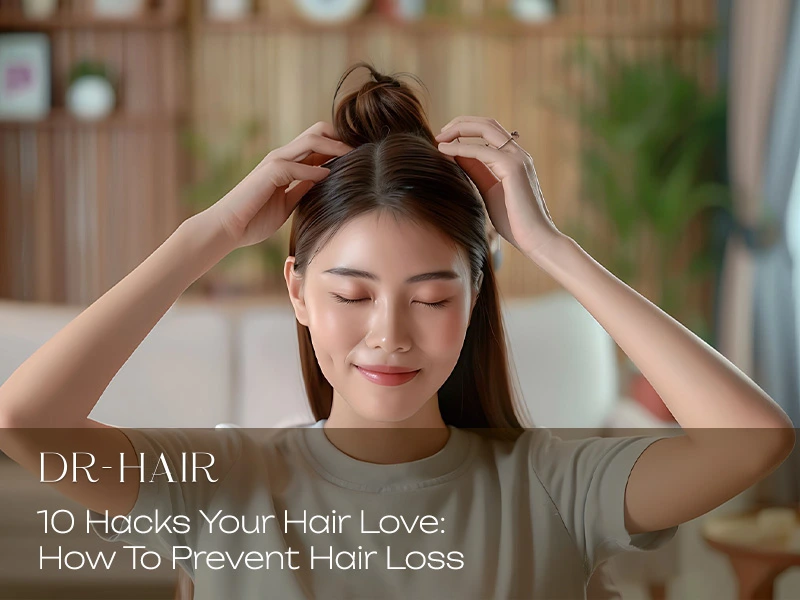Tips to Prevent Hair Loss Naturally
Noticing more hair in your brush or on your pillow lately? You’re not alone—and while it can be a little unnerving, it doesn’t always mean you’re heading for baldness. Hair loss can be triggered by everything from stress and poor nutrition to tight hairstyles and harsh hair products. The good news? You can take control. If you’ve been searching for how to prevent hair loss naturally, there are effective strategies that don’t require harsh chemicals or expensive treatments. Let’s explore 10 simple, natural ways to keep your hair healthy, strong, and growing.
1. Eat a Nutrient-Rich Diet
Learning how to prevent hair loss starts with what you eat. A nutrient-deficient diet is one of the most common and overlooked causes of thinning hair. To support healthy hair growth, make sure you’re getting enough:
Protein-rich foods like eggs, beans, and lean meats
Iron-rich greens like spinach and kale
Omega-3 fatty acids from fish, walnuts, or flaxseeds
Biotin and zinc, found in nuts, whole grains, and avocados
These nutrients help strengthen hair from the root and reduce breakage and fallout over time.
2. Avoid Excessive Heat and Styling
Overusing hot tools like straighteners, curling irons, and blow dryers can damage your hair shaft, making it prone to breakage and fallout. Likewise, tight hairstyles such as braids or high ponytails pull on the scalp and contribute to hair thinning.
How to prevent hair loss caused by styling? Air-dry your hair when possible, use heat protectants, and choose loose hairstyles that reduce scalp tension.
3. Massage Your Scalp Regularly
One of the simplest natural techniques for preventing hair loss is regular scalp massage. It helps stimulate blood flow to hair follicles, promoting healthier growth and reducing hair fall.
Tip: Massage with your fingertips for 5 minutes daily, or add nourishing oils like coconut, castor, or rosemary for extra benefits.
4. Use Natural Oils
If you’re serious about how to prevent hair loss naturally, oils should be part of your hair care routine. They nourish the scalp, reduce breakage, and create a healthy environment for growth.
Top oils include:
Coconut oil: Deep conditioning and anti-fungal properties
Castor oil: Encourages circulation and strengthens hair roots
Rosemary oil: Scientifically shown to boost hair density
Use as a weekly scalp treatment or add a few drops to your daily routine.
5. Reduce Stress
High stress levels are closely linked to hair loss, especially conditions like telogen effluvium. If you’re looking into how to prevent hair loss, managing stress should be high on your list.
Ways to lower stress naturally:
Practice yoga or meditation
Exercise regularly
Get enough sleep (7–9 hours a night)
Try journaling or mindfulness activities
6. Avoid Harsh Chemicals
Many commercial hair products contain ingredients like sulfates, parabens, and alcohol that strip your scalp of natural oils, weakening your hair over time.
Prevent hair loss naturally by switching to gentle, sulfate-free shampoos with soothing ingredients like aloe vera, tea tree oil, or chamomile.
7. Stay Hydrated
Dry hair is more prone to breakage—and a dehydrated scalp can’t support healthy follicles. Staying hydrated is a foundational part of how to prevent hair loss that many overlook.
Goal: Drink at least 8 glasses of water a day to support overall hair and scalp health.
8. Don’t Overwash Your Hair
Washing too often can remove natural oils, while infrequent washing can cause buildup and clogged follicles. The key is balance.
Best practice: Wash your hair 2–3 times a week, depending on your hair type. Use lukewarm water and gentle cleansers to avoid over-drying.
9. Protect Hair from Sun and Pollution
UV rays and environmental pollutants can damage hair structure, dry out the scalp, and accelerate hair loss.
To protect your hair:
Wear hats or scarves outside
Use leave-in conditioners with UV filters
Rinse your hair after exposure to smoke or heavy pollution
10. Try Herbal Remedies
If you’re looking into how to prevent hair loss naturally, don’t overlook herbal solutions. Certain herbs and plants have been used for centuries to strengthen hair and promote growth.
Popular options include:
Saw Palmetto: Believed to block DHT, a hormone linked to hair loss
Amla (Indian Gooseberry): Rich in antioxidants and vitamin C
Hibiscus: Often used in oils to stimulate hair follicles
Always consult your doctor before adding new supplements to your routine.
Frequently Asked Questions (FAQs)
1. Can hair loss be reversed naturally?
Yes, in many cases. If the cause is stress, poor diet, or temporary hormonal shifts, adopting natural methods can help reverse hair loss and encourage regrowth.
2. How long does it take to see results with natural remedies?
It typically takes 3 to 6 months of consistent care to notice visible improvements. Patience and persistence are key.
3. Is hair loss always permanent?
Not always. Temporary hair loss is reversible, especially when you address the root cause early. However, genetic conditions may require additional treatments.
4. Does washing hair every day cause hair loss?
Frequent washing with harsh products can dry out your scalp and cause breakage, but washing with gentle, nourishing formulas won’t directly lead to hair loss.
5. What vitamins help prevent hair loss?
Essential vitamins for strong, healthy hair include:
Biotin (B7)
Vitamin D
Vitamin E
Iron
Zinc
Consider getting tested for deficiencies and supplementing if needed.
Final Thoughts
If you’ve been wondering how to prevent hair loss naturally, the answer lies in everyday habits. From nourishing your body with the right foods to using gentle products and reducing stress, there are plenty of natural ways to protect your hair and scalp. While results may take time, consistency and care can make a significant difference.
If your hair loss continues or worsens, consider speaking with a dermatologist. Natural methods are a great foundation—but professional support can help you explore deeper causes and more targeted solutions.
